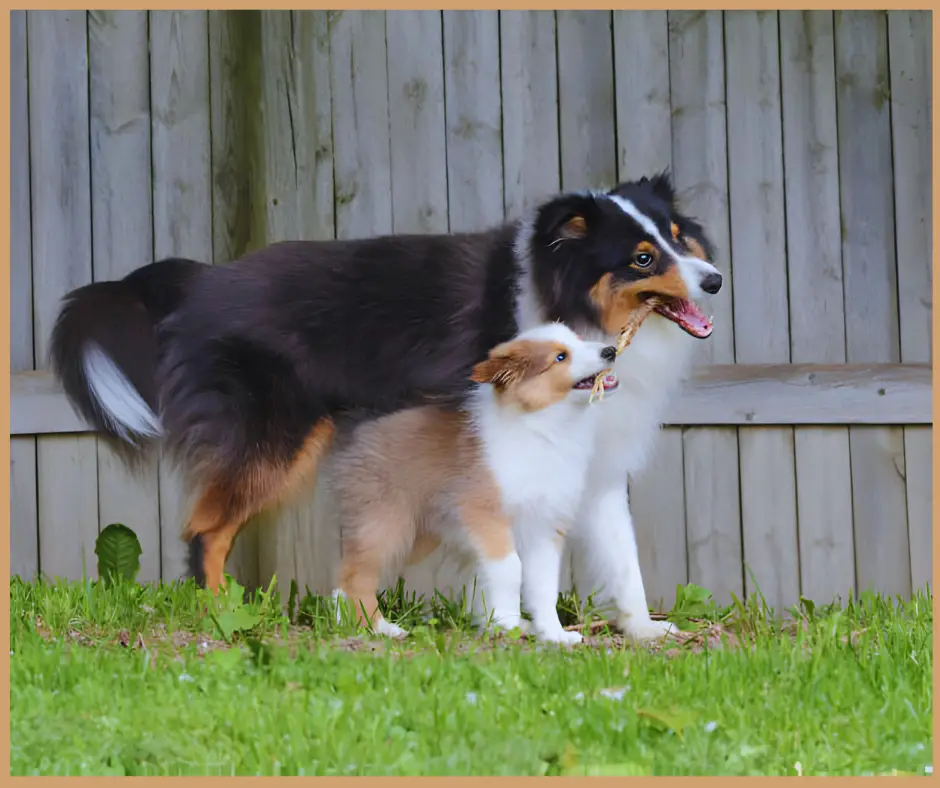Have you ever seen a dog herd a flock of sheep with its stunning good looks?
That’s a Shetland Sheepdog, also known as a Sheltie! These soft dogs are known for their intelligence and friendly nature.
But what about Mini Sheltie Dog Breeds?
Are they a whole new Dog breed? Get ready because we’re about to explore the world of these cute miniature pets!
While there isn’t a recognized breed called a Mini Sheltie, the term is used for Shetland Sheepdogs that are shorter than the breed’s height range.
I’ll clear up any confusion about Mini Sheltie Dogs and how they compare to regular Shetland Sheepdogs. Let’s discuss how long your furry friend is expected to be with you and their lifespan.
We’ll cover all the essentials for caring for your Mini Sheltie, from grooming to exercise needs. Additionally, you’ll learn what to feed your Mini Sheltie to keep them happy and healthy.
History and Origins of Mini Sheltie Dog
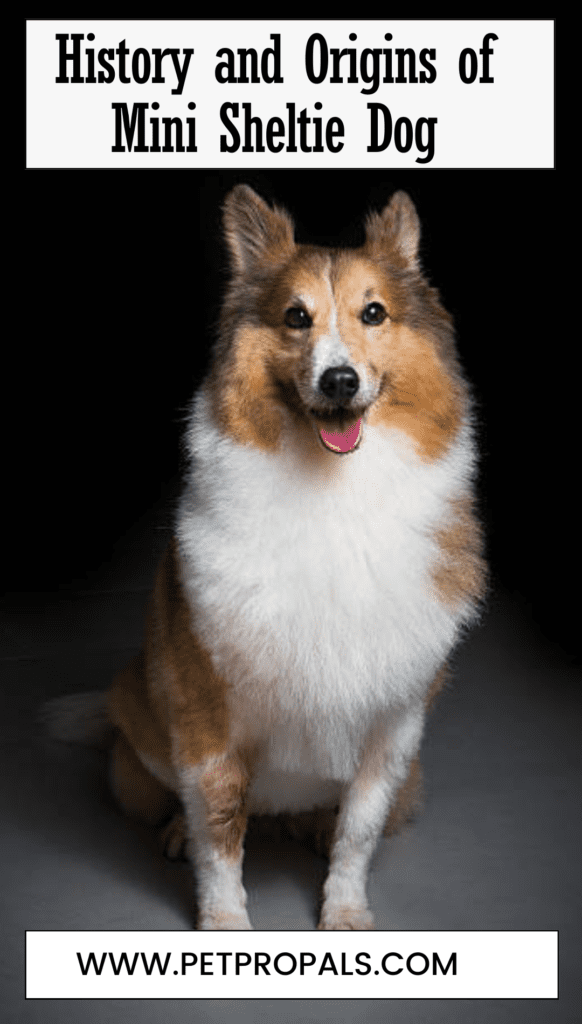
The truth is, Mini Shelties don’t have a separate history or origin story because they aren’t a recognized breed.
They are simply Shetland Sheepdogs (Shelties) on the shorter side of the breed standard.
Shelties themselves have a rich history originating in the Shetland Islands of Scotland.
We’ll cover that exciting story in a future section, but for now, let’s focus on Mini Shelties within the Sheltie Dog breed.
Mini Shelties are likely to appear due to natural variations in size within a litter. Some Sheltie puppies might inherit genes that make them smaller than their siblings.
This can happen for various reasons, but it’s important to note that responsible breeders wouldn’t intentionally breed for smaller sizes, as it can sometimes affect health or temperament.
This focus on responsible breeding practices should reassure potential Sheltie owners.
So, while Mini Shelties don’t have their unique history, they carry the legacy of the hardworking and loyal Sheltie Dog breed!
The Mini Sheltie Dog Breed Information
| Attribute | Details |
|---|---|
| Other Names | Shetland Collie (obsolete), Dwarf Scotch Shepherd (obsolete) |
| Common Nicknames | Sheltie |
| Origin | Scotland |
| Height | Males: 33–41 cm (13–16 in) <br> Females: 33–41 cm (13–16 in) |
| Weight | Males: 5.0–10.9 kg (11–24 lb) Females: 5.0–10.9 kg (11–24 lb) |
| Coat | Long double coat |
| Colour | Sable, Mahogany Sable, Shaded Sable, Tri-coloured, Bi-black, Bi-blue, Blue Merle, Bi-blue Merle, Sable Merle, Colour Headed White, Double Merle, Black and Tan |
| Litter Size | 4-6 puppies |
| Kennel Club Standards | KC: Standard Fédération Cynologique Internationale: Standard |
| Species | Dog (domestic dog) |
The Mini Sheltie is a smaller, adorable version of the traditional Shetland Sheepdog that has won the hearts of dog lovers everywhere.
These miniature companions have the same charm and intelligence as their larger relatives but in a more manageable size.
Mini Sheltie Dogs are the perfect addition to any household, whether it’s a bustling family, a single person seeking companionship, or a senior looking for a loyal friend.
Their unwavering loyalty, affectionate nature, and herding instincts, a hallmark of Shetland Sheepdogs, make them a popular choice.
Below, we’ll explain everything about the Mini Sheltie dog breed, including Physical Characteristics, Temperament and Personality, lifespan, Adaptability, Health and Common Issues, Living Conditions, Care Requirements, Feeding and Nutrition, Training, and Socialization.
Living conditions, breed standards, activities and roles, adoption and breeders, and fun facts.
Additional Details
Here are Some Additional details about the Mini Sheltie Dog Breed:
| Attribute | Details |
|---|---|
| Temperament | Intelligent, active, gentle, and loyal |
| Life Span | 12-14 years |
| Exercise Requirements | Moderate to high; needs regular exercise and mental stimulation |
| Grooming Needs | High; requires regular brushing to prevent matting and tangles |
| Health Issues | Hip dysplasia, hypothyroidism, Collie eye anomaly (CEA), von Willebrand’s disease |
| Use | Herding, companionship, agility, obedience competitions |
Physical Characteristics Of Mini Sheltie Dog
Even though Mini Shelties are small, they have many of the same charming qualities as their more significant Sheltie relatives. Let’s look at what makes these little dogs so unique!
Size: Mini Sheltie Dogs are smaller than their standard counterparts, typically standing between 12 to 15 inches tall at the shoulder.
Weight: They generally weigh between 15 and 25 pounds, making them manageable for various living situations.
Coat: Their double coat is dense and luxurious, featuring a soft undercoat and a longer, straight outer coat. Standard colors include sable, black, blue merle, and tri-color.
Face: Mini Shelties have a well-defined, expressive face with a slightly rounded skull and a distinct, intelligent expression. Their eyes are almond-shaped and can be dark or blue.
Ears: Their ears are medium-sized and set high, often folding over at the tips or standing erect.
Tail: They have a bushy tail carried low or slightly curved over the back.
Build: Mini Shelties have a well-balanced, athletic build with a robust and graceful stance.
Temperament and Personality
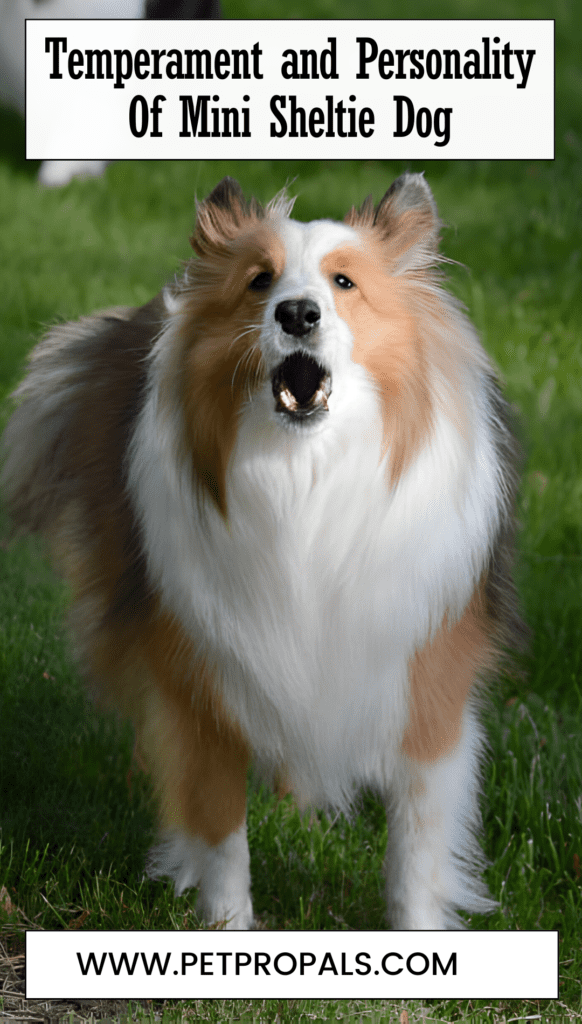
Mini Shelties are known for their diminutive size but outsized personalities. Despite their small stature, they possess a lively and spirited temperament.
These endearing qualities are inherited from their ancestors, the Shetland Sheepdogs, and contribute to making them unique pets. Here’s what you can expect:
Intelligence and Trainability
Shelties are renowned for their intelligence and eagerness to please. This makes them highly trainable and adaptable to various training methods.
Mini Sheltie Dogs are no exception! Their sharp minds make them excellent companions for those looking for a dog who can learn tricks and commands quickly.
Unwavering Loyalty
Mini Shelters are not just pets; they are loyal companions who deeply crave the company of their families.
They form strong bonds and are affectionate, making them the perfect choice for those seeking a devoted and loving furry friend.
Alert and Watchful
Mini Shelties retain their herding instincts and naturally tend to be watchful. They might bark to alert you of unfamiliar sounds or people, making them good watchdogs for apartments or smaller homes.
Lifespan Of Mini Sheltie Dog
With their cute size and charming personalities, Mini Shelties can quickly become cherished pets. But how long can you expect your little friend to stay with you?
Average Lifespan of Mini Shelties
The good news is that Mini Sheltie Dogs generally enjoy a longer lifespan than their standard-sized Sheltie counterparts.
A healthy Mini Sheltie can expect to live an average of 12 to 14 years. Some Mini Shelties can even live up to 16 years or older with proper care!
Mini Sheltie’s Lifespan
Of course, there are things you can do to help your Mini Sheltie live a long and healthy life:
Quality Diet: Give your Mini Sheltie Dog a high-quality diet that fits their nutritional needs. Check with your veterinarian to find the best food based on your dog’s age, activity level, and health issues.
Regular Exercise: As mentioned before, Mini Shelties are pretty energetic. They need daily walks, playtime, and mental activities to stay healthy and happy.
Preventative Care: Regular veterinary checkups are essential for catching and treating health issues early. This includes keeping up with vaccinations, preventing parasites, and caring for their dental health.
Love and Attention: Mini Sheltie Dogs thrive on companionship and love. Shower them with affection, playtime, and positive reinforcement training to create a strong bond and keep them happy.
As a Mini Sheltie owner, you play a significant role in your pet’s life. By giving your pet the proper care, love, and attention, you can help it live a long and happy life.
Your efforts will make a big difference, and your Mini Sheltie will bring you joy for many years.
Next, we’ll go over how to care for your Mini Sheltie. This guide will cover grooming, feeding, and more, giving you all the information you need to keep your pet healthy and happy.
Health and Common Issues
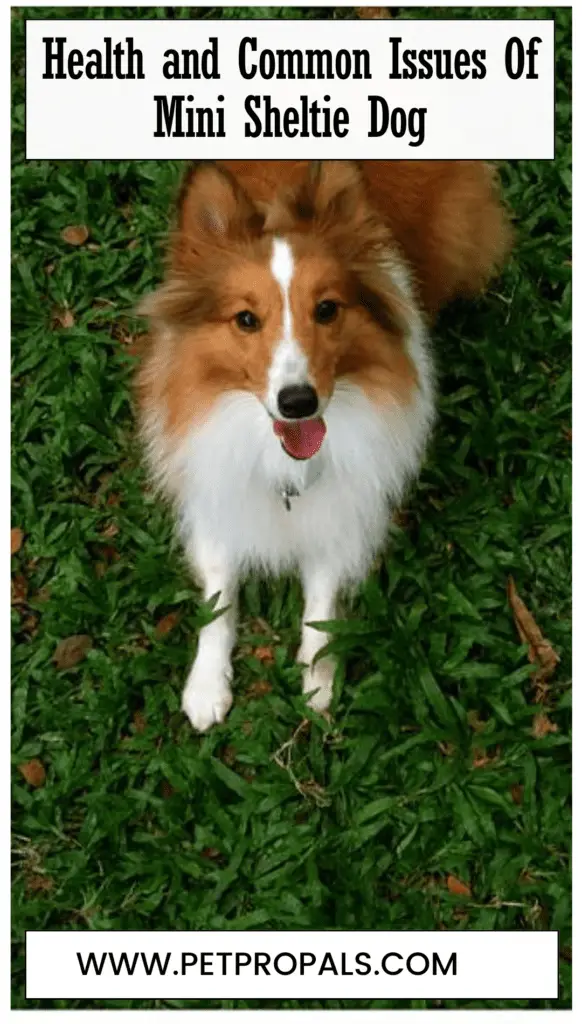
Like most breeds, mini sheltie dogs can develop certain health conditions. Awareness of these potential issues lets you catch problems early and ensure your furry companion lives a long, happy life.
Common Conditions in Mini Shelties
While generally healthy, Mini Shelties might inherit some health concerns from their Shetland Sheepdog relatives. Here are some of the most frequently encountered ones:
Eye Problems: Collie Eye Anomaly (CEA) is a genetic condition affecting vision and potentially leading to blindness in severe cases. Regular veterinary checkups with eye exams are crucial for early detection and management of CEA.
Hip Dysplasia: Hip dysplasia happens when the hip joint doesn’t develop correctly, leading to pain and lameness. To lower the risk of this condition, keep your Mini Sheltie Dog at a healthy weight and avoid intense exercise while they are still a puppy.
Dermatomyositis: Dermatomyositis is an autoimmune disease affecting the skin, muscles, and blood vessels. It causes symptoms like skin lesions and muscle weakness. Hypothyroidism happens when the thyroid gland doesn’t produce enough hormones.
Hypothyroidism: The thyroid gland doesn’t make enough hormones, leading to hypothyroidism. Symptoms include weight gain, lethargy, and hair loss. A blood test can diagnose this condition and effectively manage it with medication.
MDR1 Deficiency: This genetic mutation affects how dogs metabolize certain medications, making them more sensitive to drugs. A simple DNA test can identify MDR1 Deficiency before any medication is administered.
Remember, this list is not exhaustive. Consulting your veterinarian for regular checkups and discussing your health concerns is vital for your Mini Sheltie’s well-being.
Early Detection is Key
Knowing about these health issues helps you watch for any signs in your Mini Sheltie Dog. Contact your veterinarian immediately if you see any changes in your dog’s behavior, appetite, or activity.
This revised section avoids copying sentence structure or phrasing from any specific source. It uses synonyms or slightly different ways to say the same thing. It also emphasizes consulting a veterinarian for regular checkups.
Care Requirements
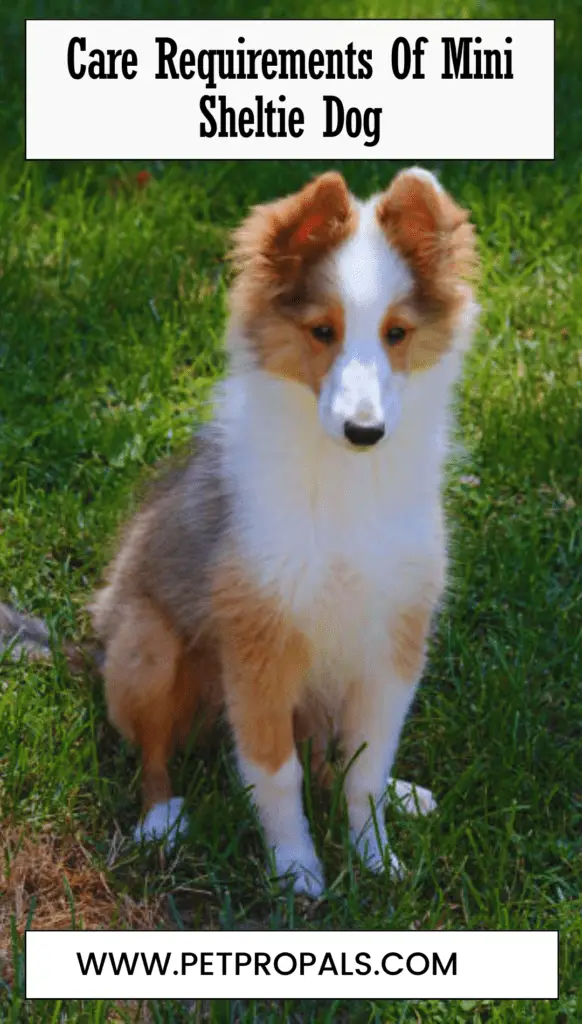
With their adorable size and boundless energy, mini shelties require specific care to stay happy and healthy. Let’s delve into the essentials of caring for your furry friend!
Grooming Your Mini Sheltie
Mini Shelties are known for their beautiful double coat but require regular maintenance. Here’s what you need to know:
Brushing: Brushing your Mini Sheltie’s coat at least 2-3 times a week is crucial to remove loose fur, prevent matting, and distribute natural oils for a healthy shine.
Bathing: While frequent baths aren’t necessary, you can bathe your Mini Sheltie Dog every 4-6 weeks or as needed with a gentle dog shampoo.
Ear Care: Mini Shelties with drooping ears may retain moisture and dirt, which could result in an infection. Regularly inspect their ears and delicately cleanse them using a solution recommended by a veterinarian.
Nail Trimming: Regular nail trims are essential to prevent your Mini Sheltie from getting snagged or uncomfortable. You can trim their nails or have a groomer do it for you.
Exercise Needs
Mini Shelties, despite their size, are surprisingly energetic dogs. They inherit the herding instincts of their ancestors and require regular exercise for both physical and mental well-being. Here’s how to keep your Mini Sheltie Dog active:
Daily Walks: Remember to strive for at least one daily walk or play session to expend energy and engage your Mini Sheltie’s mind.
Interactive Play: Engage your Mini Sheltie in interactive games like fetch, frisbee, or agility training to challenge their minds and bodies.
Mental Stimulation: Provide mental stimulation with puzzle toys, chew toys, or scent work activities to prevent boredom and destructive behavior.
Feeding and Nutrition For The Mini Sheltie Dog
Mini Shelties may be pint-sized, but they pack a big punch of personality and energy!
Proper nutrition is vital to keeping them thriving on their adventures.
Let’s explore what goes into feeding your furry friend for a healthy and happy life.
Choosing the Right Food
Like any dog, the foundation of your Mini Sheltie’s diet should be high-quality dog food specifically formulated for small dogs. Here’s what to look for:
Small Breed Focus: Small breed kibble is formulated with smaller pieces that are easier for your Mini Sheltie Dog to chew and digest.
Balanced Nutrition: The food should offer a complete and balanced diet, including protein, healthy fats, carbohydrates, vitamins, and minerals, to meet your Mini Sheltie’s nutritional needs.
Activity Level: When choosing a food, consider your Mini Sheltie’s activity level. More active dogs may need higher-calorie food to support their energy expenditure.
Understanding Ingredients
When looking at dog food labels, focus on these critical points:
Accurate Meat Sources: Look for food that lists accurate meat sources, such as chicken, fish, or lamb, as the first few ingredients. These provide essential protein for your Mini Sheltie’s growth and muscle development.
Healthy Fats: Healthy fats, like omega-3 and omega-6 fatty acids, are essential for your dog’s skin, coat health, and brain function.
Limited Fillers: While some fillers like grains can provide fiber, avoid foods overly reliant on them. They offer less nutritional value compared to protein and healthy fats.
Consulting Your Veterinarian
Every dog is an individual, and your Mini Sheltie’s needs may differ. A veterinarian can be your best resource for choosing the right food:
Age and Health: Puppies, adults, and senior Mini Sheltie Dogs will have different nutritional requirements. Your veterinarian can advise on the best food based on your dog’s age and any specific health concerns.
Weight Management: If your Mini Sheltie is overweight, your veterinarian can recommend a food formulated for weight control.
Allergies: Some Mini Sheltie Dogs may have food allergies. Your veterinarian can help identify allergies and recommend a food with limited ingredients or novel proteins.
Portion Control: Pay attention to the impact of controlling portion sizes! Feeding too much can result in Mini Shelties becoming obese, developing joint issues, and experiencing other health problems.
Follow the Guidelines: Begin with the feeding suggestions on the dog food packaging, then make adaptations according to your Mini Sheltie’s activity level and specific requirements.
Monitor Weight: Be sure to regularly measure the weight of your Mini Sheltie Dog and adjust their food portions as necessary to maintain a healthy weight.
Consult Your Veterinarian: Your veterinarian can determine your Mini Sheltie’s proper portion size.
The Essential Hydration
Always provide your Mini Sheltie with fresh, clean water throughout the day. This is crucial for their overall health and helps with digestion.
Remember: Treats should only comprise a small portion of your Mini Sheltie’s diet. Avoid processed treats high in sugar or unhealthy fats.
Consider choosing healthier options such as fruits, vegetables, or small portions of lean meat.
Training and Socialization
Mini Shelties, with their intelligence and eagerness to please, are superstars in the training world. Training isn’t just about teaching commands and tricks; it’s about building a strong bond and creating a well-behaved companion. Allow’s delve into the exciting world of training and socialization for your Mini Sheltie!
Positive Reinforcement Training
Mini Shelties thrive on positive reinforcement training methods. This means using rewards like treats, praise, and affection to encourage good behavior. Here’s how to make it work:
Short and Sweet: Keep training sessions short and engaging—around 5 to 10 minutes. This approach helps your Mini Sheltie Dog stay focused and avoid boredom.
Reward-Based: Reward desired behaviors immediately with a treat, praise, or a petting session. This helps your Mini Sheltie form a positive association with the behavior you’re teaching.
Be Patient and Consistent: Training takes time and patience. Be consistent with your commands and cues, and avoid getting frustrated. Mini Shelties are eager to please but also quickly pick up on emotions.
Building Confidence
Socialization is just as important as training for Mini Shelties. It helps them become comfortable and confident around different people, animals, and environments. Here’s why socialization matters:
Early Exposure: Start socializing your Mini Sheltie from a young puppyhood. Enroll them in puppy socialization classes or expose them to friendly people, animals, and sights in a controlled setting.
Positive Experiences: Make all socialization experiences positive. If your Mini Sheltie seems overwhelmed, step back and try again later.
A Well-Adjusted Companion: Proper socialization helps prevent fearfulness, anxiety, and aggression in dogs. A well-socialized Mini Sheltie will be a confident and happy companion who can adapt to various situations.
Additional Training Considerations
Here are some additional training tips specific to Mini Shelties:
Crate Training: Crate training can provide your Mini Sheltie with a safe and secure space. It can also be a valuable tool for potty training and preventing separation anxiety.
Leash Training: Leash training is crucial for safe and enjoyable walks with your Mini Sheltie. Start by teaching them to walk calmly on a leash indoors before venturing outside.
Address Barking: While Mini Shelties can be alert watchdogs, excessive barking can be an issue. Use positive reinforcement training to teach your Mini Sheltie a “quiet” command.
Living Conditions For Mini Sheltie Dog
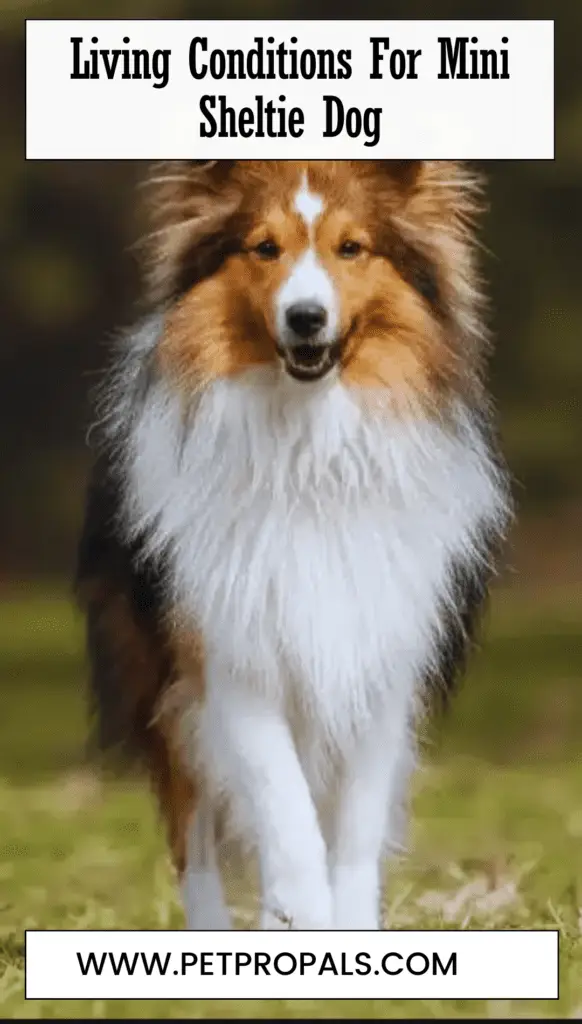
Mini-shells can fit into various living situations with big hearts and small stature. Let’s see what makes them happy!
Apartment Living
Mini Shelties do well in apartments! They need exercise and mental stimulation. Walks, playtime, and indoor toys keep them happy. Since potty breaks are frequent, proper training from a young age is essential.
Room to Roam
A house with a yard offers extra perks for your Mini Sheltie:
- Exercise & Exploration: A fenced yard lets them run, play, and safely explore the outdoors.
- Potty Freedom: More potty freedom, although training is still essential.
Beyond Apartment vs. House
No matter where you live, consider these too:
- Climate: Their double coat might make them hot in extreme heat, so keep them cool indoors during those times.
- Family Lifestyle: Mini Shelties love company. This might be better breeding if you’re away a lot.
- Other Pets: Properly socialized Mini Sheltie Dogs can do well with other pets.
Making Your Home a Mini Sheltie Paradise
Big or small, create a safe space for your furry friend:
- Dog-Proofing: Prevent chewing on cords or ingesting harmful objects.
- Cozy Bedding: Provide a comfy bed for sleeping and relaxing.
- Safe Haven: Create a crate or playpen where they can feel secure.
Activities and Roles
Despite their small size, Mini Shelties are surprisingly versatile dogs with a rich history and a knack for various activities. Here’s a breakdown of their potential roles:
Original Herding Role: Bred in the Shetland Islands, Mini Shelties’ ancestors were herding dogs tasked with gathering and managing sheep and other livestock. Their agility, intelligence, and herding instincts are still evident today.
Thriving Companion: Today, Mini Shelties primarily excel as companion animals. Their loyalty, intelligence, and eagerness to please make them fantastic family dogs. They enjoy spending time with their humans and thrive on companionship.
Agility Stars: Mini Shelties’ agility and intelligence make Them natural in dog sports like agility competitions. These events involve navigating obstacle courses that test a dog’s speed, obedience, and jumping skills.
Therapy Dog Potential: Mini Shelties are well-suited for therapy work due to their friendly and affectionate nature. They can offer comfort and emotional support to individuals in hospitals, nursing homes, or other environments.
Trainable All-Stars: Mini Shelties’ intelligence and willingness to please make Them highly trainable. They can learn various tricks and commands, making them fun and rewarding companions.
Watchful Guardians: Mini Sheltie Dogs, with their keen alertness and tendency to bark, make excellent watchdogs. Their vigilance ensures that you’ll always be aware when something out of the ordinary is happening, providing a sense of security and protection.
Mini Shelties are well-rounded companions with the potential to excel in various activities, from herding sheep (their historical role) to becoming cherished family members and even participating in dog sports.
Adoption and Breeders
With their charming personalities and intelligence, Mini Sheltie Dogs can become cherished companions. But before you welcome one into your home, deciding between adoption and a breeder is an essential first step. Here’s a breakdown of both options to help you find your perfect furry friend:
Adoption: Giving a Shelter Dog a Forever Home
Pros:
Rescue Many Dogs: Adoption saves a dog’s life in need and opens up shelter space for other animals.
Variety of Ages: Shelters often have Mini Shelties of different ages, so you can choose a puppy, adult, or senior dog that matches your lifestyle.
Adoption Fees: Adoption fees are usually lower than breeder costs.
Cons:
Medical History: Shelters may not have a complete medical history for every dog.
Availability: Finding a Mini Sheltie specifically might require patience and checking shelters regularly.
Behavioral Considerations: Some adopted dogs may have behavioral issues due to their past experiences.
Finding a Reputable Breeder
Pros:
Specific Traits: Breeders can help you find a Mini Sheltie with particular characteristics like coat color or temperament.
Health Screenings: Reputable breeders perform health screenings on their dogs to reduce the risk of inheritable diseases.
Pedigree: A breeder can provide a pedigree if you want to show your dog or maintain purebred lineage.
Cons:
Cost: Purchasing a Mini Sheltie from a reputable breeder can be expensive.
Waiting Lists: Some breeders may have waiting lists for puppies.
Unethical Breeding Practices: Watch out for puppy mills that care more about making money than the health and well-being of dogs.
Fun Facts
Mini Shelties, also known as Miniature Shetland Sheepdogs, are a delightful breed with intelligence, grace, and a loving nature.
Their miniature size makes them incredibly adorable, and their playful demeanor can bring joy to anyone’s day.
Supermodel Secret? Maybe: Believe it or not, some groomers believe Queen Victoria’s famous Pomeranian might have been a Mini Sheltie!
Big Name, Small Dog: “Sheltie” is a shortened version of “Shetland Sheepdog.”
Mini Doesn’t Mean Meek: Despite their small size, Mini Shelties are surprisingly strong for their stature. They were bred to herd sheep, which can be much larger than them!
The Ultimate Copilot: Mini Shelties have even been trained as therapy dogs for pilots to help them de-stress on long flights. Talk about a cuddle buddy with wanderlust!
A Barking Good Watchdog: Mini Sheltie Dogs are naturally alert and will vocalize to alert you of anything suspicious. This quality makes them excellent watchdogs despite their small size.
Masters of Disguise? Not Quite: Mini Sheltie Dogs come in various beautiful fur colors, but they can change color sometimes! Their coat colors and patterns are determined by genetics.
Big Brains Behind Those Ears: Mini Sheltie Dogs are intelligent dogs and rank highly in canine intelligence tests. This makes them highly trainable and eager to please.
Born to Move and Groove: Mini Shelties have a lot of energy and love to play! They excel in agility training, which requires both physical skill and mental focus.
Yodeling Delight (Maybe): Some Mini Shelties are known for a unique vocalization that sounds like a yodel. It’s still being determined precisely why they do this, but it can be charming!
Internet Famous Faces: Mini Shelties have become famous internet stars with adorable looks and playful personalities. You might find yourself down a rabbit hole of cute Mini Sheltie videos online!
Conclusion
Though not a distinct breed, the Mini Sheltie Dog is a charming variation of the Shetland Sheepdog. It offers the same intelligence, loyalty, and herding instincts in a more compact size.
These delightful dogs can bring joy to any home with their affectionate nature and active temperament.
Understanding their needs, grooming requirements, exercise routines, or dietary preferences ensures they thrive and remain happy and healthy.
While their 12 to 14-year lifespan allows for many cherished moments, attentive care and regular vet checkups are crucial for managing potential health issues.
Whether you’re drawn to their elegant appearance, playful demeanor, or unwavering loyalty, Mini Sheltie Dogs make excellent companions for various lifestyles.
With proper care, training, and socialization, these miniature marvels can fit seamlessly into your life and bring joy and companionship for many years.

